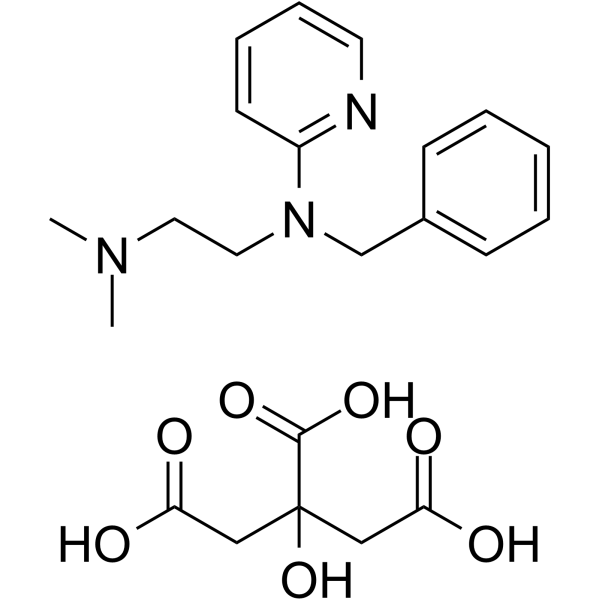TRIPELENNAMINE CITRATE
Modify Date: 2024-01-11 17:49:35

TRIPELENNAMINE CITRATE structure
|
Common Name | TRIPELENNAMINE CITRATE | ||
|---|---|---|---|---|
| CAS Number | 6138-56-3 | Molecular Weight | 447.48200 | |
| Density | N/A | Boiling Point | 387.8ºC at 760 mmHg | |
| Molecular Formula | C22H29N3O7 | Melting Point | 106-110° | |
| MSDS | N/A | Flash Point | 188.3ºC | |
Use of TRIPELENNAMINE CITRATETripelennamine citrate, an ethylenediamine derivative, is a potent histamine H1-receptor antagonist. Tripelennamine citrate lessens the allergic response of the organism caused by histamine. Tripelennamine citrate can be used for the research of rhinitis, conjunctivitis, and allergic and anaphylactic reactions[1][2][3]. |
| Name | N'-benzyl-N,N-dimethyl-N'-pyridin-2-ylethane-1,2-diamine,2-hydroxypropane-1,2,3-tricarboxylic acid |
|---|---|
| Synonym | More Synonyms |
| Description | Tripelennamine citrate, an ethylenediamine derivative, is a potent histamine H1-receptor antagonist. Tripelennamine citrate lessens the allergic response of the organism caused by histamine. Tripelennamine citrate can be used for the research of rhinitis, conjunctivitis, and allergic and anaphylactic reactions[1][2][3]. |
|---|---|
| Related Catalog | |
| Target |
H1 Receptor |
| References |
| Boiling Point | 387.8ºC at 760 mmHg |
|---|---|
| Melting Point | 106-110° |
| Molecular Formula | C22H29N3O7 |
| Molecular Weight | 447.48200 |
| Flash Point | 188.3ºC |
| Exact Mass | 447.20100 |
| PSA | 151.50000 |
| LogP | 1.40130 |
CHEMICAL IDENTIFICATION
HEALTH HAZARD DATAACUTE TOXICITY DATA
|
| RIDADR | UN 3249 |
|---|---|
| Packaging Group | III |
| Hazard Class | 6.1(b) |
| Pyridine,2-(benzyl(2-(dimethylamino)ethyl)amino)-,citrate (1:1) |
| Pyribenzamine citrate |
| EINECS 228-121-6 |
| Tripelennamine citrate |
| 1,2-Ethanediamine,N,N-dimethyl-N'-(phenylmethyl)-N'-2-pyridinyl-,2-hydroxy-1,2,3-propanetricarboxylate (1:1) |